Text
गीता का ज्ञान || DIPLOMA COURSE || BHAGAVAD GITA #bhagavadgita
.
.
.
Bhagvad gita, bhagavad gita diploma, spritual knowledge.
contact us : 9811636257
.
.
🌟 Explore the Bhagavad Gita's timeless wisdom in our 30-session course led by HG Jai Narayan Prabhuji from ISKCON. 📚 Dive into 2.5-hour sessions filled with profound teachings on life, spirituality, and self-realization. 🧘♂️ Join us on this transformative journey toward inner peace and enlightenment...
#bhagavadgitawisdom#spiritualjourney#innerpeace#enlightenment#selfrealization#mindfulness#spiritualteachings#meditationtime#lifelessons#wisdomwednesday#transformativelearning#iskcon#divinewisdom#viralwisdom#yogainspiration#spiritualgrowth#InstaSpirituality#higherconsciousness#enlightenedliving#viralthoughts#philosophyfriday#inspiringinsights#selfdiscovery#viralvibes
0 notes
Text
आपकी हर समस्या का जवाब यहाँ है। 🌐🚀 हर समस्या का विशेष समाधान, 16 जनवरी से! _____ जानने के लिए वीडियो पर क्लिक करें।
🌿 Learn the secrets of Inner Peace in a Hectic World through Bhagavad Gita 📖 and 🧘 Develop a clear and focused mind, honing your decision-making skills 🎯.
Register now :: Bhagavad Gita Diploma Course 2024 (razorpay.com)
For more details contact :- 9873854135
#BhagavadGita#Spirituality#WisdomTeachings#AncientWisdom#Philosophy#Hinduism#DivineWisdom#SelfDiscovery#Mindfulness#YogaPhilosophy#LifeLessons#VedicWisdom#InnerPeace#SpiritualJourney#Enlightenment#UniversalTeachings#GitaQuotes#SacredTexts#Dharma#KarmaYoga
0 notes
Text
📚✨ Join our Bhagavad Gita course for a Spiritual Journey! ✨📚
🌟 Embrace divine wisdom in our transformative Diploma Bhagavad Gita Course! 🌟
📖 This Nov-Dec, immerse in the sacred teachings. Join us on a path of enlightenment through book distributions, sharing timeless wisdom.
🙌 Your support spreads spiritual light! Let's distribute spiritual books, including Bhagavad Gita, for growth.
📢 Tag seekers of truth! Together, sow wisdom, awaken the divine within.
🌿 Illuminate souls with Bhagavad Gita's teachings, fostering spirituality, compassion, harmony.
🌐 Contact us [+91 98116 36257, +91 97168 87036] to join this beautiful spiritual journey. Let's create a world of spiritual awakening! 🌍🤝
#BhagavadGita#DivineWisdom#BookDistribution#Enlightenment#InnerHarmony#SpiritualJourney#TruthSeekers#AncientWisdom#Dharma#Yoga#Meditation#VedicWisdom#SelfRealization#Hinduism#Philosophy#ViralPost#TumblrFamous#Inspiration#Mindfulness#PositiveVibes
1 note
·
View note
Text
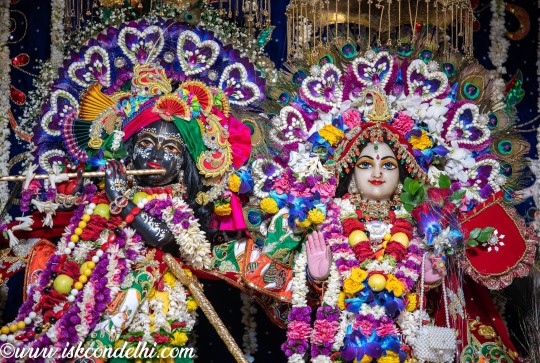

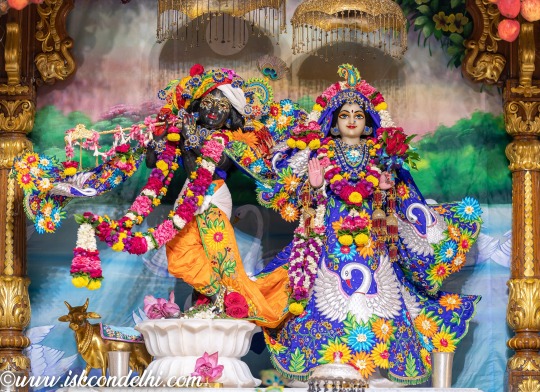
#Krishna Bliss#Divine Love Chronicles#Celestial Harmony#Sacred Vrindavan Moments#Transcendental Living#Ethereal Devotion#Mystic Radiance of Radha#Soulful Krishna Connection#Vibrant Bhakti Vibes#Enlightened Living#Spiritual Odyssey#Krishna's Universal Embrace#Love Tales in Vrindavan#Global Bhakti Wave#Wisdom Echoes#Radiant Spirituality#Krishna's Divine Influence#Heartfelt Chants for Peace#Eternal Love Dynamics#Sacred Vrindavan Insights#Feel free to use these keywords in your Tumblr posts#tags#or captions to enhance the visibility of your content and connect with like-minded individuals interested in spirituality#Krishna consciousness#and divine love.
1 note
·
View note
Text

*Translation 4.42*
*Therefore the doubts which have arisen in your heart out of ignorance should be slashed by the weapon of knowledge. Armed with yoga, O Bhārata, stand and fight.*
Purport
The yoga system instructed in this chapter is called sanātana-yoga, or eternal activities performed by the living entity. This yoga has two divisions of sacrificial actions: one is called sacrifice of one’s material possessions, and the other is called knowledge of self, which is pure spiritual activity. If sacrifice of one’s material possessions is not dovetailed for spiritual realization, then such sacrifice becomes material. But one who performs such sacrifices with a spiritual objective, or in devotional service, makes a perfect sacrifice. When we come to spiritual activities, we find that these are also divided into two: namely, understanding of one’s own self (or one’s constitutional position), and the truth regarding the Supreme Personality of Godhead. One who follows the path of Bhagavad-gītā as it is can very easily understand these two important divisions of spiritual knowledge. For him there is no difficulty in obtaining perfect knowledge of the self as part and parcel of the Lord. And such understanding is beneficial, for such a person can easily understand the transcendental activities of the Lord. In the beginning of this chapter, the transcendental activities of the Lord were discussed by the Supreme Lord Himself. One who does not understand the instructions of the Gītā is faithless, and is to be considered to be misusing the fragmental independence awarded to him by the Lord. In spite of such instructions, one who does not understand the real nature of the Lord as the eternal, blissful, all-knowing Personality of Godhead is certainly fool number one. Ignorance can be removed by gradual acceptance of the principles of Kṛṣṇa consciousness. Kṛṣṇa consciousness is awakened by different types of sacrifices to the demigods, sacrifice to Brahman, sacrifice in celibacy, in household life, in controlling the senses, in practicing mystic yoga, in penance, in forgoing material possessions, in studying the Vedas and in partaking of the social institution called varṇāśrama-dharma. All of these are known as sacrifice, and all of them are based on regulated action. But within all these activities, the important factor is self-realization. One who seeks that objective is the real student of Bhagavad-gītā, but one who doubts the authority of Kṛṣṇa falls back. One is therefore advised to study Bhagavad-gītā, or any other scripture, under a bona fide spiritual master, with service and surrender. A bona fide spiritual master is in the disciplic succession from time eternal, and he does not deviate at all from the instructions of the Supreme Lord as they were imparted millions of years ago to the sun-god, from whom the instructions of Bhagavad-gītā have come down to the earthly kingdom. One should, therefore, follow the path of Bhagavad-gītā as it is expressed in the Gītā itself and beware of self-interested people after personal aggrandizement who deviate others from the actual path. The Lord is definitely the supreme person, and His activities are transcendental. One who understands this is a liberated person from the very beginning of his study of Bhagavad-gītā.
Thus end the Bhaktivedanta Purports to the Fourth Chapter of the Śrīmad Bhagavad-gītā in the matter of Transcendental Knowledge.
*Translation 5.1*
*Arjuna said: O Kṛṣṇa, first of all You ask me to renounce work, and then again You recommend work with devotion. Now will You kindly tell me definitely which of the two is more beneficial?*
Purport
In this Fifth Chapter of the Bhagavad-gītā, the Lord says that work in devotional service is better than dry mental speculation. Devotional service is easier than the latter because, being transcendental in nature, it frees one from reaction. In the Second Chapter, preliminary knowledge of the soul and its entanglement in the material body were explained. How to get out of this material encagement by buddhi-yoga, or devotional service, was also explained therein. In the Third Chapter, it was explained that a person who is situated on the platform of knowledge no longer has any duties to perform. And in the Fourth Chapter the Lord told Arjuna that all kinds of sacrificial work culminate in knowledge. However, at the end of the Fourth Chapter, the Lord advised Arjuna to wake up and fight, being situated in perfect knowledge. Therefore, by simultaneously stressing the importance of both work in devotion and inaction in knowledge, Kṛṣṇa has perplexed Arjuna and confused his determination. Arjuna understands that renunciation in knowledge involves cessation of all kinds of work performed as sense activities. But if one performs work in devotional service, then how is work stopped? In other words, he thinks that sannyāsa, or renunciation in knowledge, should be altogether free from all kinds of activity, because work and renunciation appear to him to be incompatible. He appears not to have understood that work in full knowledge is nonreactive and is therefore the same as inaction. He inquires, therefore, whether he should cease work altogether or work with full knowledge.
1 note
·
View note
Text
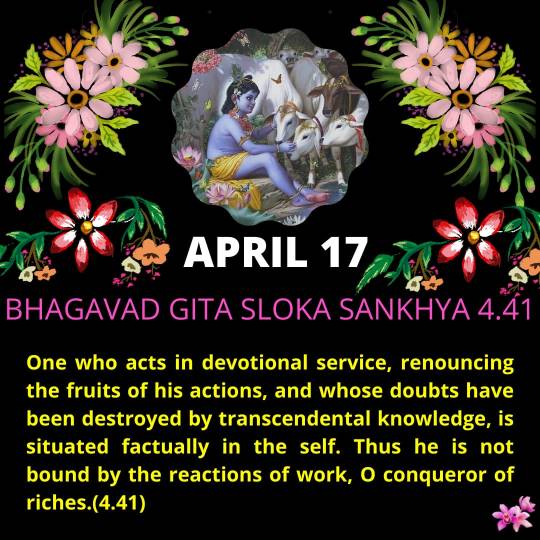
*Translation 4.41*
*One who acts in devotional service, renouncing the fruits of his actions, and whose doubts have been destroyed by transcendental knowledge, is situated factually in the self. Thus he is not bound by the reactions of work, O conqueror of riches.*
Purport
One who follows the instruction of the Bhagavad-gītā, as it is imparted by the Lord, the Personality of Godhead Himself, becomes free from all doubts by the grace of transcendental knowledge. He, as a part and parcel of the Lord, in full Kṛṣṇa consciousness, is already established in self-knowledge. As such, he is undoubtedly above bondage to action.
1 note
·
View note
Text
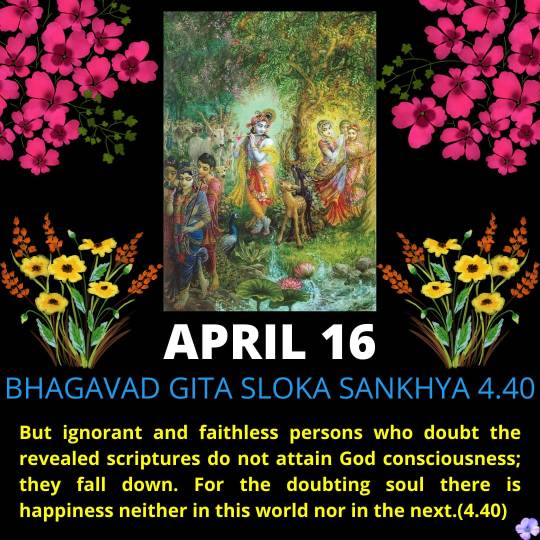
*Translation 4.40*
*But ignorant and faithless persons who doubt the revealed scriptures do not attain God consciousness; they fall down. For the doubting soul there is happiness neither in this world nor in the next.*
Purport
Out of many standard and authoritative revealed scriptures, the Bhagavad-gītā is the best. Persons who are almost like animals have no faith in, or knowledge of, the standard revealed scriptures; and some, even though they have knowledge of, or can cite passages from, the revealed scriptures, have actually no faith in these words. And even though others may have faith in scriptures like Bhagavad-gītā, they do not believe in or worship the Personality of Godhead, Śrī Kṛṣṇa. Such persons cannot have any standing in Kṛṣṇa consciousness. They fall down. Out of all the above-mentioned persons, those who have no faith and are always doubtful make no progress at all. Men without faith in God and His revealed word find no good in this world, nor in the next. For them there is no happiness whatsoever. One should therefore follow the principles of revealed scriptures with faith and thereby be raised to the platform of knowledge. Only this knowledge will help one become promoted to the transcendental platform of spiritual understanding. In other words, doubtful persons have no status whatsoever in spiritual emancipation. One should therefore follow in the footsteps of great ācāryas who are in the disciplic succession and thereby attain success.
0 notes
Text

*Translation 4.39*
*A faithful man who is dedicated to transcendental knowledge and who subdues his senses is eligible to achieve such knowledge, and having achieved it he quickly attains the supreme spiritual peace.*
Purport
Such knowledge in Kṛṣṇa consciousness can be achieved by a faithful person who believes firmly in Kṛṣṇa. One is called a faithful man who thinks that simply by acting in Kṛṣṇa consciousness he can attain the highest perfection. This faith is attained by the discharge of devotional service and by chanting Hare Kṛṣṇa, Hare Kṛṣṇa, Kṛṣṇa Kṛṣṇa, Hare Hare/ Hare Rāma, Hare Rāma, Rāma Rāma, Hare Hare, which cleanses one’s heart of all material dirt. Over and above this, one should control the senses. A person who is faithful to Kṛṣṇa and who controls the senses can easily attain perfection in the knowledge of Kṛṣṇa consciousness without delay.
0 notes
Text

*Translation 4.38*
*In this world, there is nothing so sublime and pure as transcendental knowledge. Such knowledge is the mature fruit of all mysticism. And one who has become accomplished in the practice of devotional service enjoys this knowledge within himself in due course of time.*
Purport
When we speak of transcendental knowledge, we do so in terms of spiritual understanding. As such, there is nothing so sublime and pure as transcendental knowledge. Ignorance is the cause of our bondage, and knowledge is the cause of our liberation. This knowledge is the mature fruit of devotional service, and when one is situated in transcendental knowledge, he need not search for peace elsewhere, for he enjoys peace within himself. In other words, this knowledge and peace culminate in Kṛṣṇa consciousness. That is the last word in the Bhagavad-gītā.
0 notes
Text

*Translation 4.36*
*Even if you are considered to be the most sinful of all sinners, when you are situated in the boat of transcendental knowledge you will be able to cross over the ocean of miseries.*
Purport
Proper understanding of one’s constitutional position in relationship to Kṛṣṇa is so nice that it can at once lift one from the struggle for existence which goes on in the ocean of nescience. This material world is sometimes regarded as an ocean of nescience and sometimes as a blazing forest. In the ocean, however expert a swimmer one may be, the struggle for existence is very severe. If someone comes forward and lifts the struggling swimmer from the ocean, he is the greatest savior. Perfect knowledge, received from the Supreme Personality of Godhead, is the path of liberation. The boat of Kṛṣṇa consciousness is very simple, but at the same time the most sublime.
*Translation 4.37*
*As a blazing fire turns firewood to ashes, O Arjuna, so does the fire of knowledge burn to ashes all reactions to material activities.*
Purport
Perfect knowledge of self and Superself and of their relationship is compared herein to fire. This fire not only burns up all reactions to impious activities, but also all reactions to pious activities, turning them to ashes. There are many stages of reaction: reaction in the making, reaction fructifying, reaction already achieved, and reaction a priori. But knowledge of the constitutional position of the living entity burns everything to ashes. When one is in complete knowledge, all reactions, both a priori and a posteriori, are consumed. In the Vedas (Bṛhad-āraṇyaka Upaniṣad 4.4.22) it is stated, ubhe uhaivaiṣa ete taraty amṛtaḥ sādhv-asādhūnī: “One overcomes both the pious and impious reactions of work.”
1 note
·
View note
Text
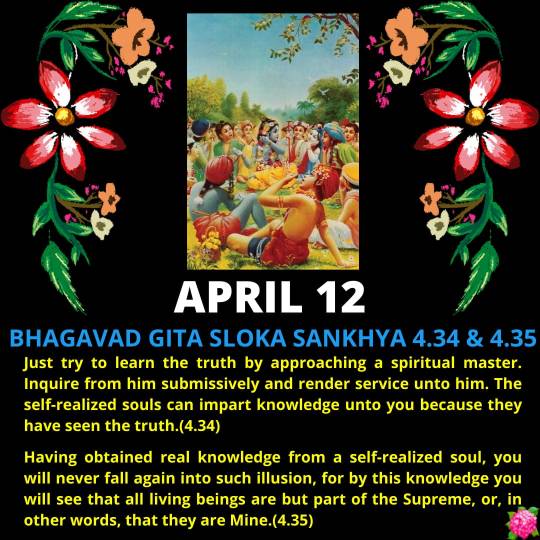
*Translation 4.34*
*Just try to learn the truth by approaching a spiritual master. Inquire from him submissively and render service unto him. The self-realized souls can impart knowledge unto you because they have seen the truth.*
Purport
The path of spiritual realization is undoubtedly difficult. The Lord therefore advises us to approach a bona fide spiritual master in the line of disciplic succession from the Lord Himself. No one can be a bona fide spiritual master without following this principle of disciplic succession. The Lord is the original spiritual master, and a person in the disciplic succession can convey the message of the Lord as it is to his disciple. No one can be spiritually realized by manufacturing his own process, as is the fashion of the foolish pretenders. The Bhāgavatam (6.3.19) says, dharmaṁ tu sākṣād bhagavat-praṇītam: the path of religion is directly enunciated by the Lord. Therefore, mental speculation or dry arguments cannot help lead one to the right path. Nor by independent study of books of knowledge can one progress in spiritual life. One has to approach a bona fide spiritual master to receive the knowledge. Such a spiritual master should be accepted in full surrender, and one should serve the spiritual master like a menial servant, without false prestige. Satisfaction of the self-realized spiritual master is the secret of advancement in spiritual life. Inquiries and submission constitute the proper combination for spiritual understanding. Unless there is submission and service, inquiries from the learned spiritual master will not be effective. One must be able to pass the test of the spiritual master, and when he sees the genuine desire of the disciple, he automatically blesses the disciple with genuine spiritual understanding. In this verse, both blind following and absurd inquiries are condemned. Not only should one hear submissively from the spiritual master, but one must also get a clear understanding from him, in submission and service and inquiries. A bona fide spiritual master is by nature very kind toward the disciple. Therefore when the student is submissive and is always ready to render service, the reciprocation of knowledge and inquiries becomes perfect.
*Translation 4.35*
*Having obtained real knowledge from a self-realized soul, you will never fall again into such illusion, for by this knowledge you will see that all living beings are but part of the Supreme, or, in other words, that they are Mine.*
Purport
The result of receiving knowledge from a self-realized soul, or one who knows things as they are, is learning that all living beings are parts and parcels of the Supreme Personality of Godhead, Lord Śrī Kṛṣṇa. The sense of an existence separate from Kṛṣṇa is called māyā (mā – not, yā – this). Some think that we have nothing to do with Kṛṣṇa, that Kṛṣṇa is only a great historical personality and that the Absolute is the impersonal Brahman. Factually, as it is stated in the Bhagavad-gītā, this impersonal Brahman is the personal effulgence of Kṛṣṇa. Kṛṣṇa, as the Supreme Personality of Godhead, is the cause of everything. In the Brahma-saṁhitā it is clearly stated that Kṛṣṇa is the Supreme Personality of Godhead, the cause of all causes. Even the millions of incarnations are only His different expansions. Similarly, the living entities are also expansions of Kṛṣṇa. The Māyāvādī philosophers wrongly think that Kṛṣṇa loses His own separate existence in His many expansions. This thought is material in nature. We have experience in the material world that a thing, when fragmentally distributed, loses its own original identity. But the Māyāvādī philosophers fail to understand that absolute means that one plus one is equal to one, and that one minus one is also equal to one. This is the case in the absolute world.
For want of sufficient knowledge in the absolute science, we are now covered with illusion, and therefore we think that we are separate from Kṛṣṇa. Although we are separated parts of Kṛṣṇa, we are nevertheless not different from Him. The bodily difference of the living entities is māyā, or not actual fact. We are all meant to satisfy Kṛṣṇa. By māyā alone Arjuna thought that the temporary bodily relationship with his kinsmen was more important than his eternal spiritual relationship with Kṛṣṇa. The whole teaching of the Gītā is targeted toward this end: that a living being, as Kṛṣṇa’s eternal servitor, cannot be separated from Kṛṣṇa, and his sense of being an identity apart from Kṛṣṇa is called māyā. The living entities, as separate parts and parcels of the Supreme, have a purpose to fulfill. Having forgotten that purpose since time immemorial, they are situated in different bodies, as men, animals, demigods, etc. Such bodily differences arise from forgetfulness of the transcendental service of the Lord. But when one is engaged in transcendental service through Kṛṣṇa consciousness, one becomes at once liberated from this illusion. One can acquire such pure knowledge only from the bona fide spiritual master and thereby avoid the delusion that the living entity is equal to Kṛṣṇa. Perfect knowledge is that the Supreme Soul, Kṛṣṇa, is the supreme shelter for all living entities, and giving up such shelter, the living entities are deluded by the material energy, imagining themselves to have a separate identity. Thus, under different standards of material identity, they become forgetful of Kṛṣṇa. When, however, such deluded living entities become situated in Kṛṣṇa consciousness, it is to be understood that they are on the path of liberation, as confirmed in the Bhāgavatam (2.10.6): muktir hitvānyathā-rūpaṁ svarūpeṇa vyavasthitiḥ. Liberation means to be situated in one’s constitutional position as an eternal servitor of Kṛṣṇa (Kṛṣṇa consciousness).
0 notes
Text

*Translation 4.32*
*All these different types of sacrifice are approved by the Vedas, and all of them are born of different types of work. Knowing them as such, you will become liberated.*
Purport
Different types of sacrifice, as discussed above, are mentioned in the Vedas to suit the different types of worker. Because men are so deeply absorbed in the bodily concept, these sacrifices are so arranged that one can work either with the body, with the mind or with the intelligence. But all of them are recommended for ultimately bringing about liberation from the body. This is confirmed by the Lord herewith from His own mouth.
*Translation 4.33*
*O chastiser of the enemy, the sacrifice performed in knowledge is better than the mere sacrifice of material possessions. After all, O son of Pṛthā, all sacrifices of work culminate in transcendental knowledge.*
Purport
The purpose of all sacrifices is to arrive at the status of complete knowledge, then to gain release from material miseries and, ultimately, to engage in loving transcendental service to the Supreme Lord (Kṛṣṇa consciousness). Nonetheless, there is a mystery about all these different activities of sacrifice, and one should know this mystery. Sacrifices sometimes take different forms according to the particular faith of the performer. When one’s faith reaches the stage of transcendental knowledge, the performer of sacrifices should be considered more advanced than those who simply sacrifice material possessions without such knowledge, for without attainment of knowledge, sacrifices remain on the material platform and bestow no spiritual benefit. Real knowledge culminates in Kṛṣṇa consciousness, the highest stage of transcendental knowledge. Without the elevation of knowledge, sacrifices are simply material activities. When, however, they are elevated to the level of transcendental knowledge, all such activities enter onto the spiritual platform. Depending on differences in consciousness, sacrificial activities are sometimes called karma-kāṇḍa (fruitive activities) and sometimes jñāna-kāṇḍa (knowledge in the pursuit of truth). It is better when the end is knowledge.
0 notes
Text
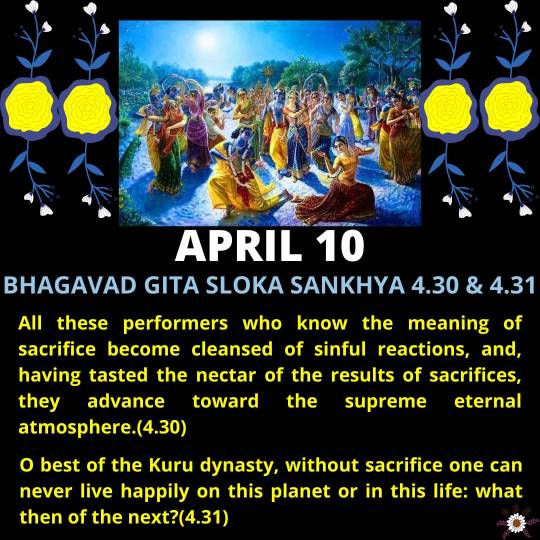
*Translation 4.30*
*All these performers who know the meaning of sacrifice become cleansed of sinful reactions, and, having tasted the nectar of the results of sacrifices, they advance toward the supreme eternal atmosphere.*
Purport
From the foregoing explanation of different types of sacrifice (namely sacrifice of one’s possessions, study of the Vedas or philosophical doctrines, and performance of the yoga system), it is found that the common aim of all is to control the senses. Sense gratification is the root cause of material existence; therefore, unless and until one is situated on a platform apart from sense gratification, there is no chance of being elevated to the eternal platform of full knowledge, full bliss and full life. This platform is in the eternal atmosphere, or Brahman atmosphere. All the above-mentioned sacrifices help one to become cleansed of the sinful reactions of material existence. By this advancement in life, not only does one become happy and opulent in this life, but also, at the end, he enters into the eternal kingdom of God, either merging into the impersonal Brahman or associating with the Supreme Personality of Godhead, Kṛṣṇa.
*Translation 4.31*
*O best of the Kuru dynasty, without sacrifice one can never live happily on this planet or in this life: what then of the next?*
Purport
Whatever form of material existence one is in, one is invariably ignorant of his real situation. In other words, existence in the material world is due to the multiple reactions to our sinful lives. Ignorance is the cause of sinful life, and sinful life is the cause of one’s dragging on in material existence. The human form of life is the only loophole by which one may get out of this entanglement. The Vedas, therefore, give us a chance for escape by pointing out the paths of religion, economic comfort, regulated sense gratification and, at last, the means to get out of the miserable condition entirely. The path of religion, or the different kinds of sacrifice recommended above, automatically solves our economic problems. By performance of yajña we can have enough food, enough milk, etc. – even if there is a so-called increase of population. When the body is fully supplied, naturally the next stage is to satisfy the senses. The Vedas prescribe, therefore, sacred marriage for regulated sense gratification. Thereby one is gradually elevated to the platform of release from material bondage, and the highest perfection of liberated life is to associate with the Supreme Lord. Perfection is achieved by performance of yajña (sacrifice), as described above. Now, if a person is not inclined to perform yajña according to the Vedas, how can he expect a happy life even in this body, and what to speak of another body on another planet? There are different grades of material comforts in different heavenly planets, and in all cases there is immense happiness for persons engaged in different kinds of yajña. But the highest kind of happiness that a man can achieve is to be promoted to the spiritual planets by practice of Kṛṣṇa consciousness. A life of Kṛṣṇa consciousness is therefore the solution to all the problems of material existence.
0 notes
Text

*Translation 4.29*
*Still others, who are inclined to the process of breath restraint to remain in trance, practice by offering the movement of the outgoing breath into the incoming, and the incoming breath into the outgoing, and thus at last remain in trance, stopping all breathing. Others, curtailing the eating process, offer the outgoing breath into itself as a sacrifice.*
Purport
This system of yoga for controlling the breathing process is called prāṇāyāma, and in the beginning it is practiced in the haṭha-yoga system through different sitting postures. All of these processes are recommended for controlling the senses and for advancement in spiritual realization. This practice involves controlling the airs within the body so as to reverse the directions of their passage. The apāna air goes downward, and the prāṇa air goes up. The prāṇāyāma-yogī practices breathing the opposite way until the currents are neutralized into pūraka, equilibrium. Offering the exhaled breath into the inhaled breath is called recaka. When both air currents are completely stopped, one is said to be in kumbhaka-yoga. By practice of kumbhaka-yoga, one can increase the duration of life for perfection in spiritual realization. The intelligent yogī is interested in attaining perfection in one life, without waiting for the next. For by practicing kumbhaka-yoga, the yogīs increase the duration of life by many, many years. A Kṛṣṇa conscious person, however, being always situated in the transcendental loving service of the Lord, automatically becomes the controller of the senses. His senses, being always engaged in the service of Kṛṣṇa, have no chance of becoming otherwise engaged. So at the end of life, he is naturally transferred to the transcendental plane of Lord Kṛṣṇa; consequently he makes no attempt to increase his longevity. He is at once raised to the platform of liberation, as stated in Bhagavad-gītā (14.26):
māṁ ca yo ’vyabhicāreṇa
bhakti-yogena sevate
sa guṇān samatītyaitān
brahma-bhūyāya kalpate
“One who engages in unalloyed devotional service to the Lord transcends the modes of material nature and is immediately elevated to the spiritual platform.” A Kṛṣṇa conscious person begins from the transcendental stage, and he is constantly in that consciousness. Therefore, there is no falling down, and ultimately he enters into the abode of the Lord without delay. The practice of reduced eating is automatically done when one eats only kṛṣṇa-prasādam, or food which is offered first to the Lord. Reducing the eating process is very helpful in the matter of sense control. And without sense control there is no possibility of getting out of the material entanglement.
0 notes
Text

*Translation 4.27*
*Others, who are interested in achieving self-realization through control of the mind and senses, offer the functions of all the senses, and of the life breath, as oblations into the fire of the controlled mind.*
Purport
The yoga system conceived by Patañjali is referred to herein. In the Yoga-sūtra of Patañjali, the soul is called pratyag-ātmā and parāg-ātmā. As long as the soul is attached to sense enjoyment it is called parāg-ātmā, but as soon as the same soul becomes detached from such sense enjoyment it is called pratyag-ātmā. The soul is subjected to the functions of ten kinds of air at work within the body, and this is perceived through the breathing system. The Patañjali system of yoga instructs one on how to control the functions of the body’s air in a technical manner so that ultimately all the functions of the air within become favorable for purifying the soul of material attachment. According to this yoga system, pratyag-ātmā is the ultimate goal. This pratyag-ātmā is withdrawn from activities in matter. The senses interact with the sense objects, like the ear for hearing, eyes for seeing, nose for smelling, tongue for tasting, and hand for touching, and all of them are thus engaged in activities outside the self. They are called the functions of the prāṇa-vāyu. The apāna-vāyu goes downwards, vyāna-vāyu acts to shrink and expand, samāna-vāyu adjusts equilibrium, udāna-vāyu goes upwards – and when one is enlightened, one engages all these in searching for self-realization.
*Translation 4.28*
*Having accepted strict vows, some become enlightened by sacrificing their possessions, and others by performing severe austerities, by practicing the yoga of eightfold mysticism, or by studying the Vedas to advance in transcendental knowledge.*
Purport
These sacrifices may be fitted into various divisions. There are persons who are sacrificing their possessions in the form of various kinds of charities. In India, the rich mercantile community or princely orders open various kinds of charitable institutions like dharma-śālā, anna-kṣetra, atithi-śālā, anāthālaya and vidyā-pīṭha. In other countries, too, there are many hospitals, old age homes and similar charitable foundations meant for distributing food, education and medical treatment free to the poor. All these charitable activities are called dravyamaya-yajña. There are others who, for higher elevation in life or for promotion to higher planets within the universe, voluntarily accept many kinds of austerities such as candrāyaṇa and cāturmāsya. These processes entail severe vows for conducting life under certain rigid rules. For example, under the cāturmāsya vow the candidate does not shave for four months during the year (July to October), he does not eat certain foods, does not eat twice in a day or does not leave home. Such sacrifice of the comforts of life is called tapomaya-yajña. There are still others who engage themselves in different kinds of mystic yogas like the Patañjali system (for merging into the existence of the Absolute), or haṭha-yoga or aṣṭāṅga-yoga (for particular perfections). And some travel to all the sanctified places of pilgrimage. All these practices are called yoga-yajña, sacrifice for a certain type of perfection in the material world. There are others who engage themselves in the studies of different Vedic literatures, specifically the Upaniṣads and Vedānta-sūtras, or the Sāṅkhya philosophy. All of these are called svādhyāya-yajña, or engagement in the sacrifice of studies. All these yogīs are faithfully engaged in different types of sacrifice and are seeking a higher status of life. Kṛṣṇa consciousness, however, is different from these because it is the direct service of the Supreme Lord. Kṛṣṇa consciousness cannot be attained by any one of the above-mentioned types of sacrifice but can be attained only by the mercy of the Lord and His bona fide devotees. Therefore, Kṛṣṇa consciousness is transcendental.
0 notes
Text
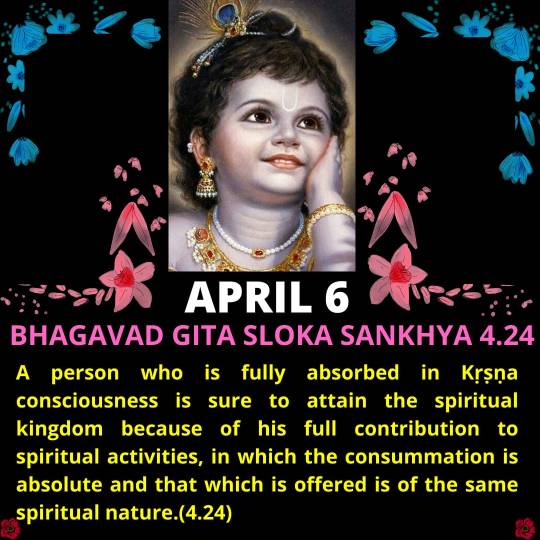
*Translation 4.24*
*A person who is fully absorbed in Kṛṣṇa consciousness is sure to attain the spiritual kingdom because of his full contribution to spiritual activities, in which the consummation is absolute and that which is offered is of the same spiritual nature.*
Purport
How activities in Kṛṣṇa consciousness can lead one ultimately to the spiritual goal is described here. There are various activities in Kṛṣṇa consciousness, and all of them will be described in the following verses. But, for the present, just the principle of Kṛṣṇa consciousness is described. A conditioned soul, entangled in material contamination, is sure to act in the material atmosphere, and yet he has to get out of such an environment. The process by which the conditioned soul can get out of the material atmosphere is Kṛṣṇa consciousness. For example, a patient who is suffering from a disorder of the bowels due to overindulgence in milk products is cured by another milk product, namely curds. The materially absorbed conditioned soul can be cured by Kṛṣṇa consciousness as set forth here in the Gītā. This process is generally known as yajña, or activities (sacrifices) simply meant for the satisfaction of Viṣṇu, or Kṛṣṇa. The more the activities of the material world are performed in Kṛṣṇa consciousness, or for Viṣṇu only, the more the atmosphere becomes spiritualized by complete absorption. The word brahma (Brahman) means “spiritual.” The Lord is spiritual, and the rays of His transcendental body are called brahma-jyotir, His spiritual effulgence. Everything that exists is situated in that brahma-jyotir, but when the jyotir is covered by illusion (māyā) or sense gratification, it is called material. This material veil can be removed at once by Kṛṣṇa consciousness; thus the offering for the sake of Kṛṣṇa consciousness, the consuming agent of such an offering or contribution, the process of consumption, the contributor and the result are – all combined together – Brahman, or the Absolute Truth. The Absolute Truth covered by māyā is called matter. Matter dovetailed for the cause of the Absolute Truth regains its spiritual quality. Kṛṣṇa consciousness is the process of converting the illusory consciousness into Brahman, or the Supreme. When the mind is fully absorbed in Kṛṣṇa consciousness, it is said to be in samādhi, or trance. Anything done in such transcendental consciousness is called yajña, or sacrifice for the Absolute. In that condition of spiritual consciousness, the contributor, the contribution, the consumption, the performer or leader of the performance and the result or ultimate gain – everything – becomes one in the Absolute, the Supreme Brahman. That is the method of Kṛṣṇa consciousness.
0 notes
Text
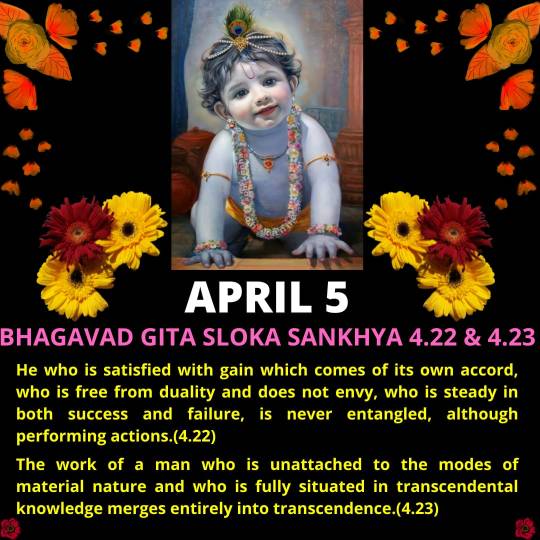
*Translation 4.22*
*He who is satisfied with gain which comes of its own accord, who is free from duality and does not envy, who is steady in both success and failure, is never entangled, although performing actions.*
Purport
A Kṛṣṇa conscious person does not make much endeavor even to maintain his body. He is satisfied with gains which are obtained of their own accord. He neither begs nor borrows, but he labors honestly as far as is in his power, and is satisfied with whatever is obtained by his own honest labor. He is therefore independent in his livelihood. He does not allow anyone’s service to hamper his own service in Kṛṣṇa consciousness. However, for the service of the Lord he can participate in any kind of action without being disturbed by the duality of the material world. The duality of the material world is felt in terms of heat and cold, or misery and happiness. A Kṛṣṇa conscious person is above duality because he does not hesitate to act in any way for the satisfaction of Kṛṣṇa. Therefore he is steady both in success and in failure. These signs are visible when one is fully in transcendental knowledge.
*Translation 4.23*
*The work of a man who is unattached to the modes of material nature and who is fully situated in transcendental knowledge merges entirely into transcendence.*
Purport
Becoming fully Kṛṣṇa conscious, one is freed from all dualities and thus is free from the contaminations of the material modes. He can become liberated because he knows his constitutional position in relationship with Kṛṣṇa, and thus his mind cannot be drawn from Kṛṣṇa consciousness. Consequently, whatever he does, he does for Kṛṣṇa, who is the primeval Viṣṇu. Therefore, all his works are technically sacrifices because sacrifice aims at satisfying the Supreme Person, Viṣṇu, Kṛṣṇa. The resultant reactions to all such work certainly merge into transcendence, and one does not suffer material effects.
0 notes